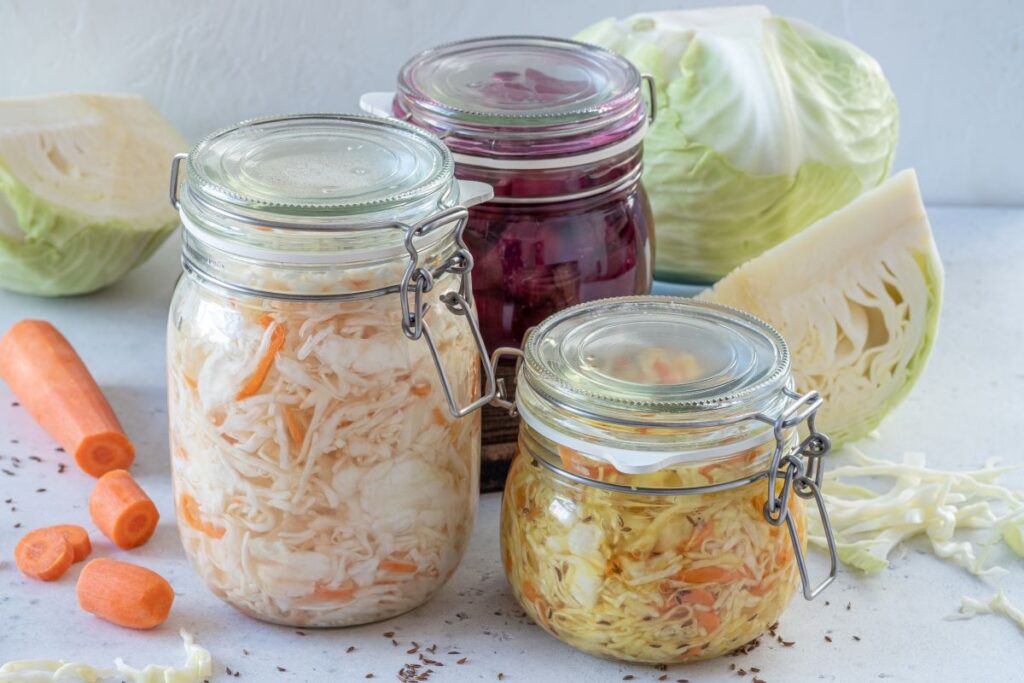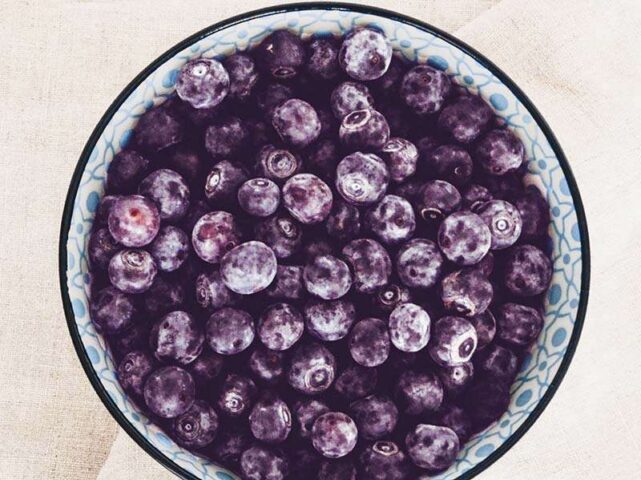5 Key Strategies to Enhance Your Gut Microbiome for Better Health

By: Reva Schlanger MS, RD, CDN
Did you know that there are around 40 trillion bacteria in your body, most of which are found in your gut. Together, these bacteria are known as your gut microbiome, and they’re incredibly important for overall health. However, certain types of bacteria in your intestines can also contribute to many diseases. Nervous that you may be needing a gut microbiome overhaul? Here are five ways to help improve your gut microbiome.
Probiotics
Probiotics are live microorganisms, usually bacteria, that provide a specific health benefit when consumed. While probiotics don’t permanently colonize the intestines, in most cases they may benefit your health by changing the overall composition of the microbiome and supporting your metabolism.
A review of several studies found that probiotics have little effect on the gut microbiome composition of healthy people. However, there is evidence that probiotics may improve the gut microbiome in those with certain gastrointestinal diseases.1 One review of 63 studies found mixed evidence of the effectiveness of probiotics in altering the microbiome, though researchers noted that the probiotics’ strongest effects seemed to be in restoring the microbiome to a healthy state after it had been compromised. Nevertheless, some studies have shown that probiotics can improve the functioning of certain gut bacteria, as well as the specific types of chemicals they produce.2
You can increase your intake of probiotics by consuming more probiotic-rich foods, including fermented foods like kimchi, kefir, sauerkraut, and yogurt. Alternatively, you can consider using a probiotic supplement. However, be sure to talk with your doctor or dietitian before starting supplementation, especially if you are taking other medications or have any underlying health conditions.
Prebiotic Containing Foods
Prebiotics, as opposed to probiotics, are foods that promote the growth of beneficial bacteria in the gut. Prebiotics are essentially fiber or complex carbs that human cells cannot digest. Instead, certain species of bacteria in the gut break them down and use them for fuel. Many fruits, vegetables, and whole grains contain prebiotics. Resistant starch- found in foods like oats, beans, and legumes, can also be a prebiotic. This type of starch is not absorbed in the small intestine and passes into the large intestine, where the microbiota breaks it down.
Many studies have shown that prebiotics can promote the growth of several types of beneficial bacteria, including Bifidobacteria.3 Certain prebiotics have also been shown to reduce insulin, triglyceride, and cholesterol levels, which could be beneficial for the prevention of conditions like heart disease and type 2 diabetes.4,5
Work on Variety
There are hundreds of species of bacteria in your intestines, each of which plays a specific role in health and requires different nutrients for growth. A diet consisting of different food types can lead to a more diverse microbiome. Generally speaking, a diverse microbiome is considered a healthy one. This is because the more species of bacteria you have, the more health benefits they may be able to contribute to.
A variety of fruits and vegetables are the best sources of nutrients for a healthy microbiome. They are rich in fiber, which your body can’t digest, but certain bacteria in your gut can digest fiber, which stimulates their growth. Beans and legumes also contain very high amounts of fiber.
One study found that following a diet rich in fruits and vegetables prevented the growth of some disease-causing bacteria.6 Certain foods like apples, artichokes, blueberries, almonds, and pistachios have also all been shown to increase Bifidobacteria in humans. Bifidobacteria are considered beneficial bacteria, as they can help prevent intestinal inflammation and enhance gut health.
Eat Fermented Foods
Fermented foods have been quite the buzz though few know what it means. Fermented foods have undergone fermentation, a process in which the sugars they contain are broken down by yeast or bacteria. Some examples of these foods include yogurt, kimchi, kombucha, kefir, and tempeh. Many of these foods are rich in lactobacilli, a type of bacteria that can benefit your health.
Research shows that people who eat yogurt daily appear to have more lactobacilli in their intestines. These people also have less Enterobacteriaceae, which is a type of bacteria associated with inflammation and several chronic conditions.7. Similarly, a number of studies have shown that yogurt consumption can improve intestinal bacteria and decrease symptoms of lactose intolerance.8
What’s more is that yogurt may also enhance the function and composition of the gut microbiome. Thinking about giving yogurt a second chance? It’s best to opt for plain, unsweetened yogurt or a flavored yogurt with minimal added sugar that is made only of milk and bacteria mixtures, also sometimes called “starter cultures.” Additionally, to reap the gut health benefits, make sure the label reads “contains live active cultures.”
Furthermore, fermented soy milk may promote the growth of beneficial bacteria, such as Bifidobacteria and lactobacilli, while decreasing quantities of some other harmful strains of bacteria. Kimchi may also benefit the gut flora.9,10
Fecal Microbial Transplantation (FMT)
FMT is a method targeted to directly change/normalize a person’s gut microbiota for a therapeutic gain. Fecal transplantation is a procedure to collect feces from a healthy donor and introduce them into a patient’s gastrointestinal tract. Stool preparations are usually administrated through frozen capsule, enema, colonoscopy, or duodenal infusion. FMT has been around for centuries, however it has come to greater popularity in the more recent years. In 2013, the United States Food and Drug Administration approved FMT for treating recurrent and refractory Clostridium difficile infection. Since then, FMT has extended rapidly and broadly not only in gastrointestinal disorders, but also in gastrointestinal diseases. FMT has demonstrated efficacy in treating inflammatory bowel diseases and irritable bowel syndrome in an increasing number of randomized controlled trials.
Step-by-step cautious fecal and recipient preparation along with adequately choosing delivery methods based on individual clinical situations are key points of the FMT process. Although current evidence deems FMT as a generally safe, therapeutic method with few adverse effects, the long-term outcomes of FMT have not been completely studied. Future research is hoping to be able to shed further light on how FMT impacts those with chronic gastrointestinal issues long-term.11,12
The bottom line is that your gut microbiome is very important for maintaining optimum health. Many studies have now shown that a disrupted microbiome can lead to numerous chronic diseases. The best way to maintain a healthy microbiome is to eat a range of fresh, whole foods, mainly from plant sources like fruits, veggies, legumes, beans, and whole grains. With that being said, there are a variety of different methods to help alter a person’s gut microbiome like a fecal transplant. If you feel that you can benefit from a change in your gut routine, it might be helpful to see a dietitian to discuss various options.
References:
- Shi, L. H., Balakrishnan, K., Thiagarajah, K., Mohd Ismail, N. I., & Yin, O. S. (2016). Beneficial Properties of Probiotics.Tropical life sciences research, 27(2), 73–90. https://doi.org/10.21315/tlsr2016.27.2.6
- McFarland L. V. (2014). Use of probiotics to correct dysbiosis of normal microbiota following disease or disruptive events: a systematic review.BMJ open, 4(8), e005047. https://doi.org/10.1136/bmjopen-2014-005047
- Carlson, J. L., Erickson, J. M., Lloyd, B. B., & Slavin, J. L. (2018). Health Effects and Sources of Prebiotic Dietary Fiber.Current developments in nutrition, 2(3), nzy005. https://doi.org/10.1093/cdn/nzy005
- Holscher, H. D., Bauer, L. L., Gourineni, V., Pelkman, C. L., Fahey, G. C., Jr, & Swanson, K. S. (2015). Agave Inulin Supplementation Affects the Fecal Microbiota of Healthy Adults Participating in a Randomized, Double-Blind, Placebo-Controlled, Crossover Trial.The Journal of nutrition, 145(9), 2025–2032. https://doi.org/10.3945/jn.115.217331
- Sharma, S., & Puri, S. (2015). Prebiotics and Lipid Metabolism: A Review.Alternative therapies in health and medicine, 21 Suppl 3, 34–42.
- Klinder, A., Shen, Q., Heppel, S., Lovegrove, J. A., Rowland, I., & Tuohy, K. M. (2016). Impact of increasing fruit and vegetables and flavonoid intake on the human gut microbiota.Food & function, 7(4), 1788–1796. https://doi.org/10.1039/c5fo01096a
- Lisko, D. J., Johnston, G. P., & Johnston, C. G. (2017). Effects of Dietary Yogurt on the Healthy Human Gastrointestinal (GI) Microbiome.Microorganisms, 5(1), 6. https://doi.org/10.3390/microorganisms5010006
- Facioni, M. S., Raspini, B., Pivari, F., Dogliotti, E., & Cena, H. (2020). Nutritional management of lactose intolerance: the importance of diet and food labelling.Journal of translational medicine, 18(1), 260. https://doi.org/10.1186/s12967-020-02429-2
- Cao, Z. H., Green-Johnson, J. M., Buckley, N. D., & Lin, Q. Y. (2019). Bioactivity of soy-based fermented foods: A review.Biotechnology advances, 37(1), 223–238. https://doi.org/10.1016/j.biotechadv.2018.12.001
- Han, K., Bose, S., Wang, J. H., Kim, B. S., Kim, M. J., Kim, E. J., & Kim, H. (2015). Contrasting effects of fresh and fermented kimchi consumption on gut microbiota composition and gene expression related to metabolic syndrome in obese Korean women.Molecular nutrition & food research, 59(5), 1004–1008. https://doi.org/10.1002/mnfr.201400780
- Wang JW, Kuo CH, Kuo FC, Wang YK, Hsu WH, Yu FJ, Hu HM, Hsu PI, Wang JY, Wu DC. Fecal microbiota transplantation: Review and update. J Formos Med Assoc. 2019 Mar;118 Suppl 1:S23-S31. doi: 10.1016/j.jfma.2018.08.011. Epub 2018 Sep 1. PMID: 30181015.
- Benech, N., Sokol, H. Fecal microbiota transplantation in gastrointestinal disorders: time for precision medicine.Genome Med 12, 58 (2020). https://doi.org/10.1186/s13073-020-00757-y







